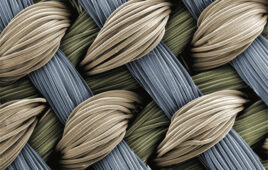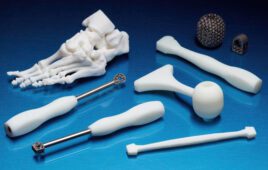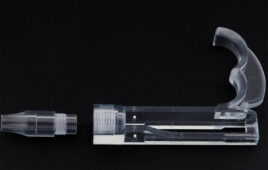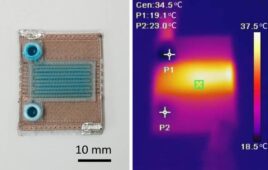Shortages of critical medical products have hampered the public health response to the COVID-19 pandemic. By using the rapid design and manufacturing capabilities of industrial 3D printing technology, a team of medtech companies developed a new nasopharyngeal swab and brought it to market in only 20 days.
Steven K. Pollack, Carbon

Resolution Medical used Carbon’s lattice design software and Digital Light Synthesis technology to swiftly create at least 19 different swab designs during the product development process. The final product is shown on the far right. (Image courtesy of Carbon)
The COVID-19 pandemic spotlights the value of additive manufacturing in responding to just-in-time manufacturing needs in the life sciences. In this article, we describe taking a disposable diagnostic product from concept to market in the space of 3 weeks by using a digital industrial 3D printing technology.
Early in 2020, Beth Israel Deaconess Medical Center (BIDMC), Harvard University and the U.S. Army assembled a team to address the short supply of nasopharyngeal (NP) swabs, a key component of the RT-PCR molecular assay for COVID-19 diagnostic testing. The team included several 3D printing companies and academics, all of whom believed that a digital industrial 3D printing technology could circumvent supply-chain breakdowns and enable new swabs to be designed, manufactured and clinically assessed rapidly.
NP swabs used in the molecular assay for COVID-19 are a Class I medical device. They are required to be biocompatible, as they are introduced deep into the nasal cavity. To minimize patient risk, clinicians prefer that they be sterile. Finally, new NP swabs must be tested for compatibility with RT-PCR assays and perform as well as traditional flocked swabs. There are no standards for the properties of NP swabs, so the team designed a 3D-printed swab by reproducing the mechanical properties of conventional swabs and their ability to capture a sample.
Minnesota-based Resolution Medical, an experienced user of Carbon’s Digital Light Synthesis technology, collaborated with Carbon on the project, using software design tools to create open lattices for maximum surface area and sample capture. The swab’s shaft also needed to be flexible enough to undergo a 180-degree bend and tough enough to withstand 10 cycles of 180-degree twisting during sample collection without breaking.
Carbon identified Keystone Industries’ KeySplint Soft Clear resin, an FDA-cleared dental material for splints and other oral health appliances, as having the appropriate mechanical properties. The resin’s suitability also opened the opportunity for the large network of Carbon’s dental partners to rapidly use the material to print and supply swabs to Resolution for final assembly and distribution.
Working first with BIDMC, non-sterile swabs were fabricated, packaged and assessed for compatibility with the PCR test. For expediency, the packaged swabs were validated for on-site autoclave sterilization while validation of pre-sterilized swabs progressed in parallel. Once PCR compatibility was established, a small clinical trial demonstrated the non-inferiority of the 3D-printed swabs to the conventional swabs. U.S. healthcare facilities then began ordering the Resolution Medical lattice swab for evaluation.
A second-generation swab design yielded improved mechanical properties post-sterilization and improved flexibility without sacrificing sample collection efficiency. The new design was evaluated in more than 200 patients under an institutional review board study at Stanford University and determined to be equivalent in diagnostic power to both the first-generation swab and conventional flocked swabs. The clinicians were also satisfied with the comfort level. These second-generation swabs have been widely sold to hospitals across the country since Resolution Medical launched them on April 8, 2020 — just 20 days after the first design efforts.
In July, Resolution Medical launched a sterilized version of the lattice swab, alleviating the need for on-site sterilization at hospitals. These swabs have an extended shelf life and the same mechanical properties of the second-generation swab.
This “sprint” from a medical need to fully validated product is a testament not only to the power of just-in-time digital design and manufacturing, but also the utility of additive manufacturing in expediting product development timelines in the life sciences space, whether or not in the context of a crisis.
Steven K. Pollack is a science fellow at Carbon. He has worked in the medical device field for close to 40 years and is a former director of the Office of Science and Engineering Laboratories in the Center for Devices and Radiological Health at the FDA.
The opinions expressed in this blog post are the author’s only and do not necessarily reflect those of Medical Design and Outsourcing or its employees.




